- Home
- /
- History
The history of Paradis Latin
From 1803 to today
The history of Paradis Latin is closely linked to that of Paris. Now classified as a historical heritage of the French capital, its origins go back to 1802 when Napoleon Bonaparte decided to build the Théâtre Latin. After being destroyed by fire during the Franco-Prussian war of 1870, the building was rebuilt in 1889 by Gustave Eiffel, at the same time as its fabled Tower, and was renamed Paradis Latin. Explore the key dates that have marked the history of the oldest Parisian cabaret and made it a mythical entertainment venue.
1803
Opening of the Théâtre Latin
In 1802, Napoleon Bonaparte, First consul of France then, decided to build a theater on rue des Fossés Saint Victor: the Théâtre Latin. Its inauguration took place the following year. This theater was not one of those “cafés-concerts” (“caf’concs” according to the expression of the time) on the Right Bank of the Seine where “ditties were sung”. No, it was a popular establishment frequented by a heterogeneous clientele, and where aristocrats, bourgeois and intellectuals liked slumming it with artists, students, workmen and merchants.
The atmosphere was that of the “Human Comedy” by Honoré de Balzac, and was culvitated by a literary, political and poetic fauna. They used to meet in the large basement lounge, that they unanimously nicknamed “l’abreuvoir littéraire” (literally, “the literary watering place”). The greatest French writers of the time were frequently seen there, such as Balzac, Alexandre Dumas (both father and son), and later Prosper Mérimée.
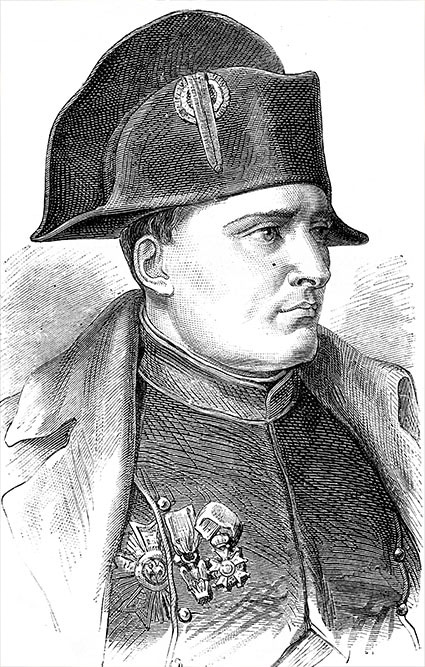

1803
Opening of the Théâtre Latin
In 1802, Napoleon Bonaparte, First consul of France then, decided to build a theater on rue des Fossés Saint Victor: the Théâtre Latin. Its inauguration took place the following year. This theater was not one of those “cafés-concerts” (“caf’concs” according to the expression of the time) on the Right Bank of the Seine where “ditties were sung”. No, it was a popular establishment frequented by a heterogeneous clientele, and where aristocrats, bourgeois and intellectuals liked slumming it with artists, students, workmen and merchants.
The atmosphere was that of the “Human Comedy” by Honoré de Balzac, and was culvitated by a literary, political and poetic fauna. They used to meet in the large basement lounge, that they unanimously nicknamed “l’abreuvoir littéraire” (literally, “the literary watering place”). The greatest French writers of the time were frequently seen there, such as Balzac, Alexandre Dumas (both father and son), and later Prosper Mérimée.
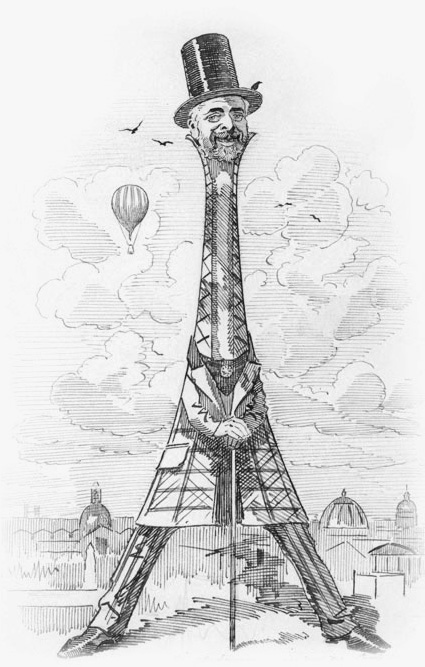
1889
The Universal Exhibition
In 1887, France prepared to host the Universal Exhibition of 1889. The young Republic wanted to celebrate with pomp the 100th anniversary of French Revolution, the Declaration of the Rights of Man and of the Citizens, and the abolition of privileges of noble birth.
A question spread through the corridors of the City Hall: “Can we arrange an appointment with the whole world while there are burnt stones and beams just five hundred meters from Notre-Dame?” The answer was obvious: of course not! Therefore, our theater rose from its ashes like the Poenix. To rebuild it, Paris called on the famous … Gustave Eiffel!

1889
The Universal Exhibition
In 1887, France prepared to host the Universal Exhibition of 1889. The young Republic wanted to celebrate with pomp the 100th anniversary of French Revolution, the Declaration of the Rights of Man and of the Citizens, and the abolition of privileges of noble birth.
A question spread through the corridors of the City Hall: “Can we arrange an appointment with the whole world while there are burnt stones and beams just five hundred meters from Notre-Dame?” The answer was obvious: of course not! Therefore, our theater rose from its ashes like the Poenix. To rebuild it, Paris called on the famous … Gustave Eiffel!
January 20, 1889
The Paradis Latin was born...
The new theater was completed in January 1889. Its construction is a continuation of History since Gustave Eiffel used the subterranean ruins of the surrounding wall of Philippe-Auguste to embed the metallic columns on which the building stands.
The inauguration took place on January 20, 1889. Triumph. The hall was praised for its architecture, its “cathedral-like elegance”, its balanced volumes, and the perfection of the finishing touches.
People stopped for a long time below a large cupola fixed to the ceiling, high up of the hall. On its four compass points, the words “Operetta”, “Ballet”, “Pantomime”, “Eccentricities” could be read. This cupola justified the change of name. The old theater, despite the fact that it had been superbly rebuilt, had to step aside in favour of a new ambition: to become a place of varied entertainment. Tragedies and comedies were then substituted with Operettas, ballets and other “eccentricities” on the stage. The era demanded it. The Theater has become Paradise. The Théâtre Latin was dead, but long live to the Paradis Latin!
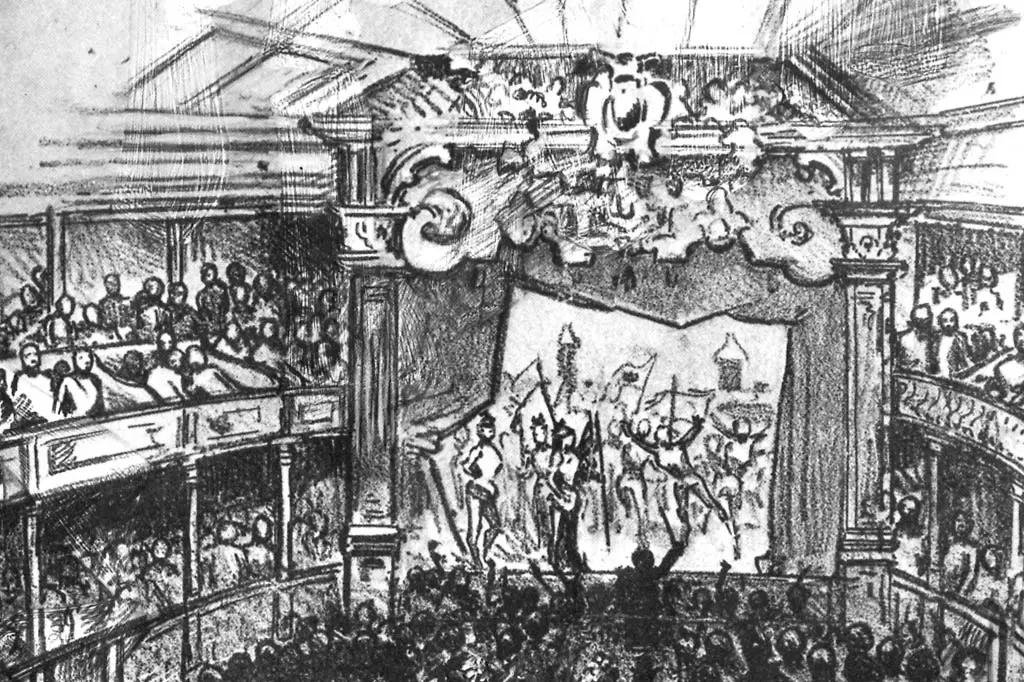

January 20, 1889
The Paradis Latin was born...
The new theater was completed in January 1889. Its construction is a continuation of History since Gustave Eiffel used the subterranean ruins of the surrounding wall of Philippe-Auguste to embed the metallic columns on which the building stands.
The inauguration took place on January 20, 1889. Triumph. The hall was praised for its architecture, its “cathedral-like elegance”, its balanced volumes, and the perfection of the finishing touches.
People stopped for a long time below a large cupola fixed to the ceiling, high up of the hall. On its four compass points, the words “Operetta”, “Ballet”, “Pantomime”, “Eccentricities” could be read. This cupola justified the change of name. The old theater, despite the fact that it had been superbly rebuilt, had to step aside in favour of a new ambition: to become a place of varied entertainment. Tragedies and comedies were then substituted with Operettas, ballets and other “eccentricities” on the stage. The era demanded it. The Theater has become Paradise. The Théâtre Latin was dead, but long live to the Paradis Latin!
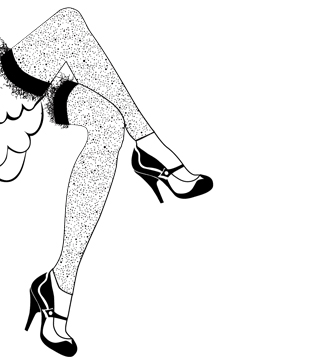
End of the 19th century
Instant success
After the inauguration, it was instant success. The Paradis Latin was full every evening: all of the shows were a triumph. Let’s mention, for the record, “Scientia”, an operetta that was in tune with the times, created in January 1889. The same year, the famous musician André Messager performed a ballet, “Les Bleuets”, in which Yvette Guilbert, who was going to become the first French international star, made her debut. Since this era did not shy away from mixing the genres, “La Mandragore”, an adaptation of a libertine tale by Machiavelli, was also performed. The famous Florentine political thinker of the Renaissance certainly never imagined that his writings would one day be performed in a cabaret!
In the early 20th century, the Parisian nightlife began a slow displacement from the Left Bank to the Right Bank. The Paradis Latin was forced to close its doors in the 1930s.

End of the 19th century
Instant success
After the inauguration, it was instant success. The Paradis Latin was full every evening: all of the shows were a triumph. Let’s mention, for the record, “Scientia”, an operetta that was in tune with the times, created in January 1889. The same year, the famous musician André Messager performed a ballet, “Les Bleuets”, in which Yvette Guilbert, who was going to become the first French international star, made her debut. Since this era did not shy away from mixing the genres, “La Mandragore”, an adaptation of a libertine tale by Machiavelli, was also performed. The famous Florentine political thinker of the Renaissance certainly never imagined that his writings would one day be performed in a cabaret!
In the early 20th century, the Parisian nightlife began a slow displacement from the Left Bank to the Right Bank. The Paradis Latin was forced to close its doors in the 1930s.
1973
28 rue du Cardinal Lemoine
Forty years later, Jean Kriegel, a real estate developer, bought the building at 28 and 28 bis rue du Cardinal Lemoine. He had initially planned to renovate the old building into apartments.
The new owner went from room to room while he visited the building, and was surprised to find eighteen thousand pipettes and other stills. Those remains of the former activity of the place had been abandoned by the last owner.
More surprisingly, upon destroying the partitions and false ceilings, the impressive metallic structure created by Eiffel was revealed …! Fragments of posters and pieces of scenery were beneath it. Among them, the proud owner found a poster of Paradis Latin …
On the first floor, the workmen uncovered a stunning structure made up of gilts, columns, arches and capitals. But the most surprising was coming: a superb cupola hand painted to the glory of pantomime, operetta, ballet and eccentricities. Amazed by the magic of the place, Jean Kriegel decided to restore to its former glory the Paradis Latin.
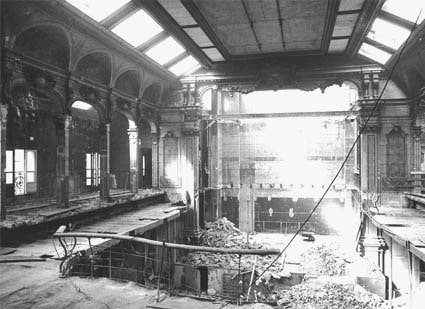

1973
28 rue du Cardinal Lemoine
Forty years later, Jean Kriegel, a real estate developer, bought the building at 28 and 28 bis rue du Cardinal Lemoine. He had initially planned to renovate the old building into apartments.
The new owner went from room to room while he visited the building, and was surprised to find eighteen thousand pipettes and other stills. Those remains of the former activity of the place had been abandoned by the last owner.
More surprisingly, upon destroying the partitions and false ceilings, the impressive metallic structure created by Eiffel was revealed …! Fragments of posters and pieces of scenery were beneath it. Among them, the proud owner found a poster of Paradis Latin …
On the first floor, the workmen uncovered a stunning structure made up of gilts, columns, arches and capitals. But the most surprising was coming: a superb cupola hand painted to the glory of pantomime, operetta, ballet and eccentricities. Amazed by the magic of the place, Jean Kriegel decided to restore to its former glory the Paradis Latin.
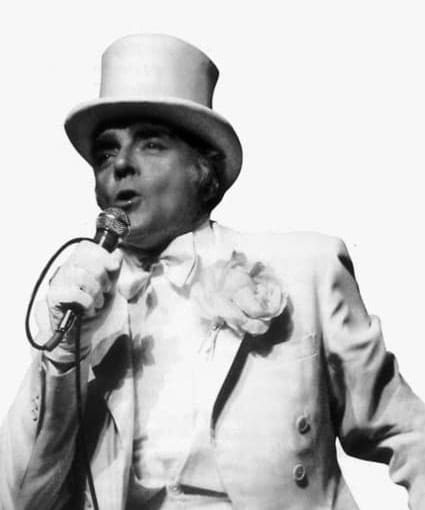
1977
Jean-Marie Rivière
The Paradis Latin has regained glory! Entirely refurbished after nearly three years of painstaking renovation, the Paradis Latin reopened its doors on November 10, 1977. A man presided over the ceremony: its new artistic director, Jean-Marie Rivière, who was the most famous name of the music hall since his success at the Alcazar. On November 14, 1977, he presented “Paris Paradis”, a poetic and burlesque show that he had produced with Pierre Simonini and Frédéric Botton. It was an unequivocal success. Once again, the Paradis Latin has rose from the ashes, and forever!

1977
Jean-Marie Rivière
The Paradis Latin has regained glory! Entirely refurbished after nearly three years of painstaking renovation, the Paradis Latin reopened its doors on November 10, 1977. A man presided over the ceremony: its new artistic director, Jean-Marie Rivière, who was the most famous name of the music hall since his success at the Alcazar. On November 14, 1977, he presented “Paris Paradis”, a poetic and burlesque show that he had produced with Pierre Simonini and Frédéric Botton. It was an unequivocal success. Once again, the Paradis Latin has rose from the ashes, and forever!
1987
Show must go on!
A new show followed, co-written and directed by Christian Dura: “Champagne” in 1984, then another one, “Hello Paradis” in 1987, and finally “Viva Paradis” to commemorate the centenary of the place.
For the tenth anniversary of the new Paradis Latin, in 1987, the show “Hello Paradis” welcomed a boogie-boogie on a giant pick-up, a fabulous Romeo and Juliet, modern ballets, an imaginary scene, a gypsy saga, a mini-musical in Louisiana, a guinguette on the Marne and, of course, the famous Cancan. During this special evening, the popular Line Renaud, faithful to the cabaret, blew out the ten candles of the Paradis Latin’s anniversary cake, and went on the stage to sing “Feeling”. This song was a worldwide hit in its American adaptation of the song “Pour moi”, that had been written by her recently deceased husband, Loulou Gasté. The performance of Line Renaud at the Paradis Latin remains an unforgettable emotional moment in the history of French music.
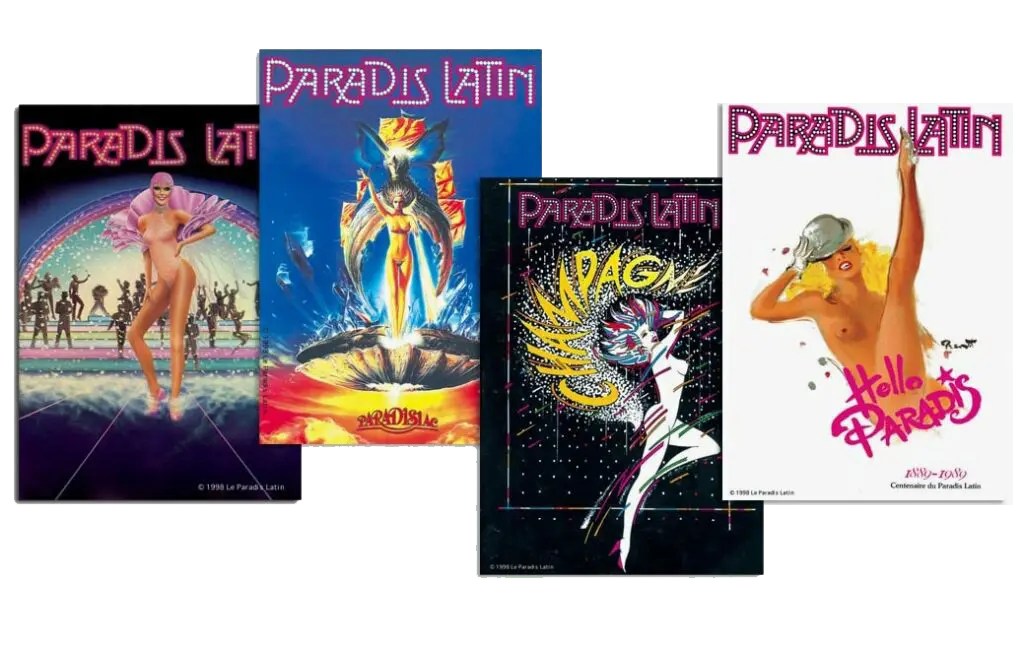

1987
Show must go on!
A new show followed, co-written and directed by Christian Dura: “Champagne” in 1984, then another one, “Hello Paradis” in 1987, and finally “Viva Paradis” to commemorate the centenary of the place.
For the tenth anniversary of the new Paradis Latin, in 1987, the show “Hello Paradis” welcomed a boogie-boogie on a giant pick-up, a fabulous Romeo and Juliet, modern ballets, an imaginary scene, a gypsy saga, a mini-musical in Louisiana, a guinguette on the Marne and, of course, the famous Cancan. During this special evening, the popular Line Renaud, faithful to the cabaret, blew out the ten candles of the Paradis Latin’s anniversary cake, and went on the stage to sing “Feeling”. This song was a worldwide hit in its American adaptation of the song “Pour moi”, that had been written by her recently deceased husband, Loulou Gasté. The performance of Line Renaud at the Paradis Latin remains an unforgettable emotional moment in the history of French music.
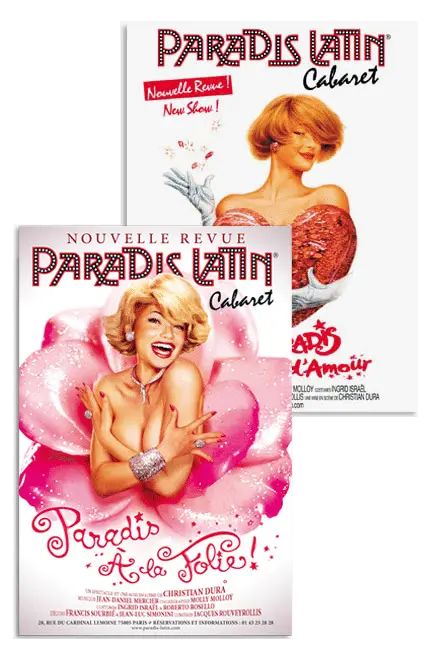
1995
More than 2 million spectators
In May 1995, Jean Kriegel chose to retire. For nearly twenty years, the director amazed 2 million spectators, with 6 shows and more than 1600 unforgettable evenings! Sidney Israël and his son Harold took over from him as owners, and a new era began for the Paradis Latin, with an international expansion, and 3 successful shows: “Viva Paradis”, “Paradis d’Amour” and “Paradis à la Folie”.

1995
More than 2 million spectators
In May 1995, Jean Kriegel chose to retire. For nearly twenty years, the director amazed 2 million spectators, with 6 shows and more than 1600 unforgettable evenings! Sidney Israël and his son Harold took over from him as owners, and a new era began for the Paradis Latin, with an international expansion, and 3 successful shows: “Viva Paradis”, “Paradis d’Amour” and “Paradis à la Folie”.
Currently!
Modernity and magic
At the end of 2018, businessman Walter Butler acquired the Paradis Latin, and decided to produce a new show. The choice of Kamel Ouali to take up this challenge was obvious. The famous director and choreographer has created “L’Oiseau Paradis”, a thrilling show with amazing choreography, sets, costumes and music. An international cast of about thirty artists and attractions animates the venue and makes the show modern, sensual and poetic, while respecting the codes of French cabaret.
At the end of 2022, he once again entrusted Kamel Ouali with the creation of a new cabaret show for a family audience: “Mon Premier Cabaret”.
New tasty menus have been created by Guy Savoy for lunches and dinners.
To top it off, Walter Butler decided to completely renovate the private box, and to build two majestic mosaics, one inspired by Klimt and the other in homage to Napoleon. They now adorn the bars on the first floor.
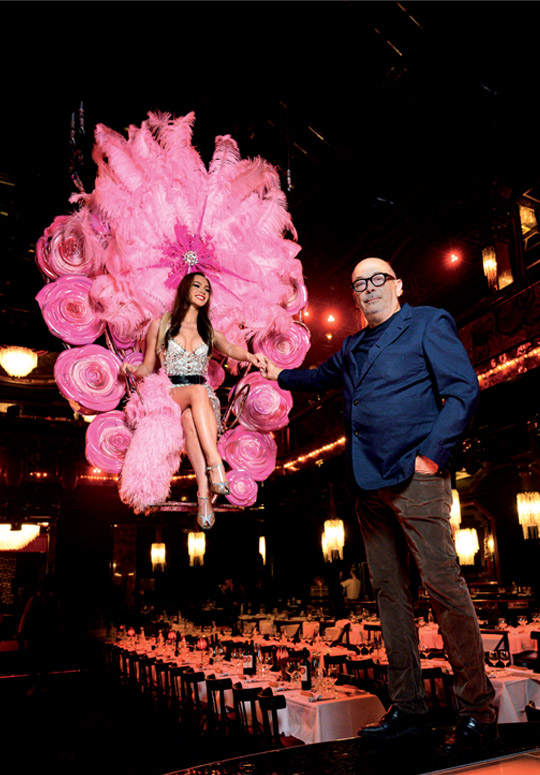

Currently
Modernity and magic
At the end of 2018, businessman Walter Butler acquired the Paradis Latin, and decided to produce a new show. The choice of Kamel Ouali to take up this challenge was obvious. The famous director and choreographer has created “L’Oiseau Paradis”, a thrilling show with amazing choreography, sets, costumes and music. An international cast of about thirty artists and attractions animates the venue and makes the show modern, sensual and poetic, while respecting the codes of French cabaret.
At the end of 2022, he once again entrusted Kamel Ouali with the creation of a new cabaret show for a family audience: “Mon Premier Cabaret”.
New tasty menus have been created by Guy Savoy for lunches and dinners. .
To top it off, Walter Butler decided to completely renovate the private box, and to build two majestic mosaics, one inspired by Klimt and the other in homage to Napoleon. They now adorn the bars on the first floor.
If you enjoyed the history of Paradis Latin, you may be interested by the history of Parisian cabarets.







